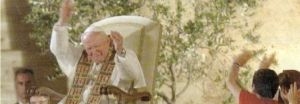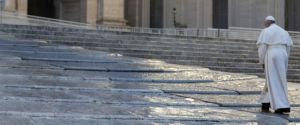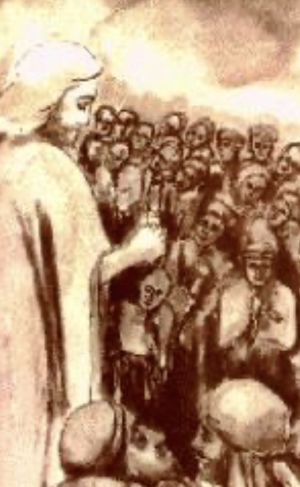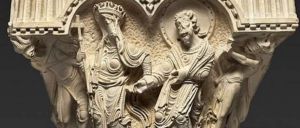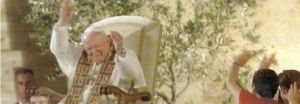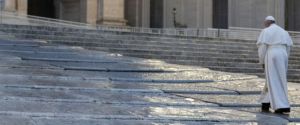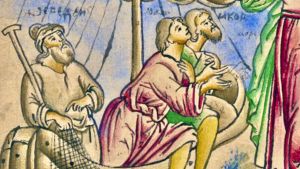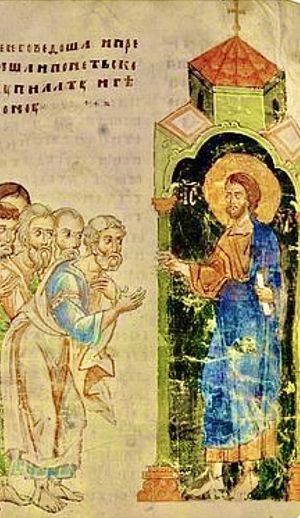
don Giuseppe Nespeca
Giuseppe Nespeca è architetto e sacerdote. Cultore della Sacra scrittura è autore della raccolta "Due Fuochi due Vie - Religione e Fede, Vangeli e Tao"; coautore del libro "Dialogo e Solstizio".
A "glorious" future that brings life
Dear Brothers and Sisters,
In today's liturgy the Evangelist Matthew, who will accompany us throughout this liturgical year, presents the beginning of Christ's public mission. It consisted essentially in preaching the Kingdom of God and healing the sick, showing that this Kingdom is close at hand and is already in our midst. Jesus began his preaching in Galilee, the region where he grew up, the "outskirts" in comparison with the heart of the Jewish Nation which was Judea, and in it, Jerusalem. But the Prophet Isaiah had foretold that this land, assigned to the tribes of Zebulun and Napthali, would have a glorious future: the people immersed in darkness would see a great light (cf. Is 8: 23-9: 2). In Jesus' time, the term "gospel" was used by Roman emperors for their proclamations. Independently of their content, they were described as "good news" or announcements of salvation, because the emperor was considered lord of the world and his every edict as a portent of good. Thus, the application of this phrase to Jesus' preaching had a strongly critical meaning, as if to say God, and not the emperor, is Lord of the world, and the true Gospel is that of Jesus Christ.
The "Good News" which Jesus proclaims is summed up in this sentence: "The Kingdom of God - or Kingdom of Heaven - is at hand" (cf. Mt 4: 17; Mk 1: 15). What do these words mean? They do not of course refer to an earthly region marked out in space and time, but rather to an announcement that it is God who reigns, that God is Lord and that his lordship is present and actual, it is being realized. The newness of Christ's message, therefore, is that God made himself close in him and now reigns in our midst, as the miracles and healings that he works demonstrate. God reigns in the world through his Son made man and with the power of the Holy Spirit who is called "the finger of God" (Lk 11: 20). Wherever Jesus goes the Creator Spirit brings life, and men and women are healed of diseases of body and spirit. God's lordship is thus manifest in the human being's integral healing. By this, Jesus wanted to reveal the Face of the true God, the God who is close, full of mercy for every human being; the God who makes us a gift of life in abundance, his own life. The Kingdom of God is therefore life that asserts itself over death, the light of truth that dispels the darkness of ignorance and lies.
Let us pray to Mary Most Holy that she will always obtain for the Church the same passion for God's Kingdom which enlivened the mission of Jesus Christ: a passion for God, for his lordship of love and life; a passion for man, encountered in truth with the desire to give him the most precious treasure: the love of God, his Creator and Father.
[Pope Benedict, Angelus, 27 January 2008]
Call: new Creation and dedicated work, integrated
Dear brothers and sisters.
1. […] Dear friends, being here in Pomposa Abbey, where since the ninth century many people have lived together to follow Christ exclusively, gives me the opportunity to remind you that every Christian, and each one of you, is called to follow in the footsteps of the Son of God.
The ascetic and material work of the monks was, in fact, always at the service of the religious and human growth of the people of this area. And the artistic beauty of the Abbey expresses the truth, freedom and dignity of the person who works in a Christian manner.
Here we can clearly see that "work must not be a mere necessity, but must be considered an authentic vocation, a call from God to build a new world, in which justice and brotherhood coexist, a foretaste of the kingdom of God, in which there will be neither shortages nor limitations" (Address to workers, 30 January 1979).
2. Some of you may wonder how it is possible to realise the sublime gift that is the vocation to be children of the Almighty Lord. There are many difficulties that man encounters in recognising God's plan in his own life. In addition to self-love, which causes him to withdraw into himself, the conditions of social life, often conceived and structured without reference to God, who - unfortunately - is considered by many to be alien to authentically human interests, often act as an obstacle.
Yet Christ, who called the holy abbot Guido, St Pier Damiani, Guido d'Arezzo and many other monks whose names are unknown to us, also addresses his invitation to you, so that in your daily life and work you may accept his invitation to follow him.
One might then ask: "What form should the vocation of the lay faithful, who live and work in the world, take?" Configured to Christ through Baptism, every believer is a witness to divine mercy, which, as it has regenerated us, recreates everything through us, associating us with the plan to "recapitulate all things in Jesus" (Eph 1:10).
In this 'new creation', Christians are called to work with 'the Word of life' (1 Jn 1:1). In their lay state, they persevere in their work, on land or at sea, aware that what they are doing is not merely cooperation, but union with Christ in his redemptive work (cf. Gaudium et spes, 67).
3. Faith is a gift, and believers, recognising God as Father, attain the fullness of their humanity: they then know how to live and die, how to hope, how to love, spreading serenity and peace around them. In this way, they contribute to the building of the new earth and the new heavens (1 Pt 3:13).
I urge you, dear brothers and sisters, not to resist Christ, not to reject the Word who became flesh. Rather, welcome him without reserve, because around him all human existence and the whole world are called to gather in unity and be renewed.
The Abbey in which we find ourselves shows, in its history, how this is possible. The monk, in fact, knowing full well that religious dependence on God does not lead to death but fulfils life in its fullness, consecrates himself exclusively to him. In the rhythm marked by 'Ora et labora', he praises the Lord and points the world towards the One to whom each of us must constantly turn our gaze and our mind. He follows Christ in poverty, obedience and virginal consecration; he offers himself to him totally and definitively. The lay faithful also live by Christ if they converse with him in prayer, encounter him in the sacraments and show him their love by observing the commandments.
Personal and liturgical prayer and moral commitment are intimately connected with friendship with the Redeemer and with the apostolic and missionary task that follows from it.
Dear brothers, always feel yourselves in deep communion with those who in monasteries unceasingly praise the Lord and, supported also by their prayer, bear fruits of holiness with an irreproachable conduct of life in every moment of your existence.
4. This spiritual solidarity shows that work and time devoted exclusively to God are not opposed to each other, but complement each other, as we can clearly see in the 'Ora et labora' of the monks of St Benedict. Devotion to God (the 'ora') is the foundation of authentic dedication (the 'labora') to people and to the earth, which is their home.
Whatever field you work in, you are always called to be witnesses and evangelisers, that is, to make Christ visible, who 'was portrayed before you' (cf. Gal 3:1). Work springs from prayer, just as charity flows from faith. Adhering to Christ and entrusting oneself to his hands generates total openness to the divine will.
Moreover, work, though tiring, when done in close union with Christ, makes us love life, no longer seen as a source of anxiety, but as a training ground for virtue that forms us in serenity and peace.
5. Brothers and sisters, I invite you, finally, to offer your generous contribution to the new evangelisation, which contemporary society so badly needs, and to work actively for the spread of the Gospel in your workplaces. Bring to everyone that hope and solidarity which every person constantly longs for and which can only be found in Christ. Always nourish yourselves with God and with a concrete love that speaks of him to those you meet. I entrust each of you to the Virgin Mary, that you may know how to listen, welcome and cherish the Word made flesh.
May the awareness of the maternal presence of the Mother of God be for you and your families a daily comfort and stimulus to do good.
Once again, I thank you for this invitation, for this very evocative meeting. The Benedictine monks who left us this sanctuary are always present here with their inspiration. But here, at the same time, over the centuries, there has lived and continues to live a population that, from generation to generation, has distinguished itself above all for its agricultural work and fishing. All this constitutes a special synthesis, I would say evangelical. We know well how in the Gospel there are those who work the land as well as fishermen, people loved by Jesus, transformed into apostles.
Today, the Pope, the successor of Peter, who was one of these fishermen, comes to say to you fishermen and to you workers of the land: you are called to be apostles, not by changing your profession and the conditions of your life, but by following Christ, according to the simple and prophetic words of the Benedictine Abbey, of St. Benedict: 'Ora et labora'. This is your method in the apostolate, the simplest and most effective. I hope that this "Ora et labora" will become your daily programme and, despite all the difficulties of agricultural and maritime life, will also make you serene, happy and bearers of good to others.
[Pope John Paul II, speech at Pomposa, 22 September 1990]
Beginning of the public mission. Opening, not effort
Today’s Gospel (cf. Mt 4:12-23) presents us with the beginning of Jesus’ public ministry. This occurred in Galilee, a land on the periphery of Jerusalem that was looked upon with suspicion because the population was mixed with Gentiles. Nothing good and new was expected from that region. However, it was precisely there that Jesus, who had grown up in Nazareth in Galilee, began his preaching.
He proclaimed the central core of his teaching in his condensed appeal: “Repent, for the kingdom of heaven is at hand” (v. 17). This announcement is like a powerful ray of light that pierces the darkness and splits the fog and evokes the prophecy of Isaiah that is read on Christmas Eve: “The people who walked in darkness have seen a great light; those who dwelt in a land of deep darkness, on them light has shined” (Is 9:2). With the coming of Jesus, Light of the world, God the Father showed his closeness and friendship to humanity. These [gifts] are freely given to us regardless of our merits. Closeness to God and friendship with God, are not deserved but gifts freely given by God. We must safeguard these gifts.
The appeal to conversion that Jesus addresses to all men and women of good will is fully understood, precisely in view of the event of the manifestation of the Son of God, on which we meditated on recent Sundays. It is often impossible to change life, to abandon the path of egotism, of evil, to abandon the way of sin because we centre our commitment to conversion only on ourselves and on our strengths, and not on Christ and his Spirit. However, our adherence to the Lord cannot be reduced to a personal effort, no. To think this would also be a sin of pride. Our adherence to the Lord cannot be reduced to a personal effort. Instead, it must express itself in a trusting opening of the heart and of the mind in order to welcome the Good News of Jesus. This is — the Word of Jesus, the Good News of Jesus, the Gospel — that changes the world and hearts! We are thus called to trust Christ’s Word, to open ourselves to the Father’s mercy and to allow ourselves to be transformed by the grace of the Holy Spirit.
This is where a true journey of conversion begins. Just as occurred to the first disciples: the encounter with the divine Teacher, with his gaze, with his Word spurred them to follow him, to change their lives by placing themselves concretely at the service of the Kingdom of God.
The surprising and decisive encounter with Jesus began the disciples’ journey, transforming them into proclaimers and witnesses of God’s love for his people. May each of us follow in the footsteps of the Saviour to offer hope to those who thirst for it, imitating these first heralds and messengers of the Word of God.
May the Virgin Mary whom we address in this prayer of the Angelus, support these intentions and strengthen them with her maternal intercession.
[Pope Francis, Angelus, 26 January 2020]
Crisis, Good News and social aspect
Overwork Mission Family, by unbalanced
(Mk 3:20-21)
Today’s short Gospel can be interpreted according to different reading plans: let’s start with a vocational approach.
The family core of society should also be a springboard to the adventure of Faith that urges other bonds.
The kinsmen can be dismayed by our desire to give ourselves entirely to God in sisters and brothers in a wider sense.
And sometimes the affections and natural constraints can prevent the fulfilment of the Mission to which we are called.
Sometimes, even important commitments in the Church’s action remain half or completely frustrated - due to a “fondness” and impediments that we are unable to ‘cut’.
Now we come to the historical level:
Jesus also had serious problems in his “house”, but the Gospel passage refers to the nascent Church in Peter’s dwelling in Capernaum, very close to the Synagogue.
Over time, the two almost adjacent realities found themselves fiercely facing each other.
Yet in the Abode of Peter at one point the number of those from Judaism, as well as pagans, who converted to the Lord's proposal exploded.
The People themselves and the religious culture that generated Christ [his «Family»] had difficulty questioning themselves. And the first reaction was rejection.
That new portion of the Jewish lineage that recognized Jesus Messiah seemed to want to do more and more of its own.
Social aspect:
Indeed, the hearth and its own clan had become alarmed, because adult Jesus did not follow a submissive behavior.
So the relatives decided to bring him back by force (cf. vv.31-35) considering him an unbalanced who wore out their internal and with authorities on the territory relations.
But the beliefs now crystallized in the Synagogue - as well as the theological and ‘cordial’ heritage of all its compromise reality - no longer seemed viable. Why?
The imperial system implanted in Galilee had weakened the sense of sharing and fraternity. Closures strengthened by the religiosity of the time.
The increasing observance of purity standards was a factor of serious social and cultural marginalization.
Entire sections of the population were excluded from the relationship with God: precisely those most in need of hope, and of a lovable ‘face’.
Instead of promoting acceptance and participation, the devoted rules even favoured separations and exclusions.
Political, economic and social structure, and sacred ideology, conspired in favor of weakening the central values of the spirit of communion.
In today’s Gospel passage we note precisely how the narrow limits of the family went to conflict with the proposal of the new Rabbi, to recover the clenchement of solidarity..
In short, it was in the House of Peter that every small family gained breath, opening up itself not only to the nation, but to the wider human Family.
Integral Assembly, even with women and sickly ill persons, or of uncertain and distant.
An absolutely new reality; no longer gathered only for worship but unable of ‘living together’.
[Saturday 2nd wk. in O.T. January 24, 2026]
Crisis and social aspect
Overwork Mission Family, unbalanced
(Mk 3:20-21)
"And he came into the house; and again the crowd gathered together, so that they could not even eat bread. And when they had heard, his [those around him] went out to get him, because they said, He is beside himself".
Today's short Gospel can be interpreted on different levels: let us begin with a vocational approach.
The family is the nucleus of society of all times, but Christ and the believer know that it should not constitute a cage.
Rather, it should be a springboard towards the adventure of Faith, which solicits other bonds.
Life in the Spirit activates us for the building of the Hundredfold, in the great ecclesial and human family.
The kinsmen may be dismayed by our desire to give ourselves entirely to God in the brothers.
Faced with exhausting activity they become apprehensive, because we are always going against the grain... so close relatives worry about our health, or the honour of home.
Sometimes, affections and natural ties can impede the fulfilment of the Mission to which we are called.
Of course, when those who do not understand are precisely those from whom one expects the most help, the suffering becomes great.
Sometimes, even important commitments in the work of the Church remain half-hearted or completely frustrated - due to affections and impediments that we are unable to cut off.
Let us come to the historical level.
Jesus had good problems at home too, but the Gospel passage refers to the nascent Church in Peter's dwelling in Capernaum.
A more instinctive and less 'qualified' reality, but very close to the traditional house of prayer [synagogue] of the place, located on the same small road perpendicular to the lake, just a little higher up.
In the course of time, the two almost adjacent realities faced each other bitterly in theology - even to the point of competing architecturally, as archaeologists well know.
The more 'noble' and ancient of the two accused the other of being an uprooted - hence unacceptable, eccentric to the sacred identity customs of the chosen people.
Yet in Peter's dwelling at a certain point the number of those from Judaism explodes, as well as pagans who convert to the Lord's proposal.
Thus the first community of believers in the Lord begins to be perhaps more substantial than the assembly in the Synagogue, just a few steps away.
The very people and religious culture that generated Christ [his "Family"] struggled to question themselves. And the first reaction is one of rejection.
That portion of the Jewish lineage that recognised Jesus as the Messiah seemed to want to go its own way.
Social aspect:
Indeed, the hearth and clan proper were alarmed, because the adult Jesus did not behave submissively.
He compromised the name of his household, spent energy on others - to the point of exhaustion... absurdly in favour of outsiders, perhaps 'enemies' of the Jewish nation.
So the relatives decided to bring him back by force (vv.31-35) considering him an unbalanced person who was wearing out the internal relations and the relations of the entire dynasty with the authorities in the land.
But we know that by extending the bond of 'blood' to those who would listen, Jesus did not allow external evaluations to remove him from his task.
Let us see what the situation was.
In ancient Israel, the sense of community and the clan formed the basis of coexistence. The goal of the Law was: "There shall be no needy among you" (Deut 15:4).
And like the great prophets, Christ and his intimates attempted to strengthen the sense of sharing, returning to the deep spirit of what were once articulations of coexistence.
Precisely: clan, hearth, community - expressions of God's love manifesting itself.
The 'big family' ensured protection for particular families and the less well-off.
It was a guarantee of land ownership; hence it gave a sense of freedom - and was a vehicle for the possibility of adhering to one's own tradition.
Besides cultural defence, it was in community life that the people of that era expressed the spirit of concrete solidarity.
For Christ, too, defending the clan, its spiritual baggage, its fraternal action ... was to defend the Covenant itself.
But the House of Peter [the nascent Church] was beginning to overtake all the ancient reality.
The convictions now crystallised in the Synagogue, as well as the theological and benevolent bearing of all its compromise truth - no longer seemed viable. Why?
The imperial system implanted in Galilee had debilitated the sense of broad and minute communion, indeed of clan and hearth.
Herod the Great - who died in Jericho in 4 BC. - and his son Herod Antipas (37BC-39AD) had brought families to such a crisis level that they had to fend for themselves and shut themselves away from the most pressing needs.
The taxes to be paid to the government and the temple were increasingly exorbitant, which accentuated indebtedness.
Here and there the Hellenistic mentality crept in with traits of individualism previously unknown to the Semitic mentality.
The imposed duty of receiving soldiers and giving them hospitality in homes where they did what they wanted even on women, and the frequent threats of violent repression, forced people to deal with problems of survival.
All this led to closure, to retreating to one's immediate needs.
There was less and less practice of hospitality, the sharing of goods, the canteen, and the asylum of the marginalised. Expressions of fraternity and care in which the early Christians were already champions.
In this way, closures were reinforced by the religiosity of the time.
The ever-increasing observance of purity rules was a factor of serious social and cultural marginalisation.
Entire sections of the population were being excluded from their relationship with God: precisely those most in need of hope and a face.
Instead of fostering acceptance and sharing, devout norms even favoured separations and exclusions [in particular: all women, children, foreigners, the sick or the handicapped...].
Political, economic and social structure, and sacred ideology, conspired to weaken the core values of the spirit, and the practice of sharing.
In today's Gospel passage, we see precisely how the narrow limits of the nuclear family came into conflict with the new Rabbi's proposal: to recover the unitive afflatus, both in a broad and detailed sense.
In short, it was in the House of Peter that the small family acquired breath, opening up not only to the Nation, but to the wider Family of the Human Community.
An integral assembly, even of women and the shaky, or uncertain and distant.
An absolutely new reality, no longer gathered for worship but unable to coexist.
Peace that flows from truth
When Jesus, during his time on earth, went from village to village preaching the Good News of truth and love, he caught the attention of those who listened to him. Unlike the Scribes, who were rejected because of their hypocrisy, we are told that the Lord amazed because "he taught them as one having authority" (Mk 1:22). Indeed, every human community needs, and therefore seeks, strong and inspiring leaders to guide others along a path of hope [...].
No one can be exempt from this process. Although no culture can use the damage done in the past as an excuse to avoid facing the difficulties of meeting the contemporary social needs of its people, it is also true that only through a willingness to accept historical truth is it possible to gain a healthy understanding of contemporary reality and adhere to the vision of a harmonious future [...].
Commitment to truth opens the way to lasting reconciliation through a healing process that involves asking for and granting forgiveness, two indispensable elements of peace. In this way, our memory is purified, our heart made serene and our future filled with a hope well founded on the peace that flows from truth.
[Pope Benedict, Letter for the 20th anniversary of John Paul II's visit to Australia, 22 September 2006]
Fullness of Revelation, Spirit as principle of life and inner Master
1. Spiritual life needs enlightenment and guidance. This is why Jesus, in founding the Church and sending the Apostles into the world, entrusted them with the task of teaching all the nations, as we read in the Gospel according to Matthew (Mt 28:19-20), but also to "preach the Gospel to the whole creation", as the canonical text of Mark's Gospel says (Mk 16:15). St Paul also speaks of the apostolate as "enlightening everyone" (Eph 3:9).
But this work of the evangelising and teaching Church belongs to the ministry of the Apostles and their successors and, in a different capacity, to all the members of the Church, to continue forever the work of Christ the "one Master" (Mt 23:8), who brought to humanity the fullness of God's revelation. There remains the need for an interior Master, who makes the teaching of Jesus penetrate the spirit and heart of mankind. It is the Holy Spirit, whom Jesus himself calls the "Spirit of truth", and whom he promises as the One who will guide into all truth (cf. Jn 14:17; 16:13). If Jesus said of Himself: "I am the truth" (Jn 14:6), it is this truth of Christ that the Holy Spirit makes known and spreads: "He will not speak of Himself, but will tell all that He has heard . . . he will take of mine and proclaim it to you" (Jn 16:13-14). The Spirit is Light of the soul: "Lumen cordium", as we invoke it in the Pentecost Sequence.
2. The Holy Spirit was Light and inner Master for the Apostles who had to know Christ in depth in order to fulfil their task as his evangelisers. He was and is so for the Church, and, in the Church, for believers of all generations, and especially for theologians and teachers of the Spirit, for catechists and leaders of Christian communities. It has been and is also for all those who, within and outside the visible confines of the Church, wish to follow God's ways with a sincere heart, and through no fault of their own find no one to help them decipher the riddles of the soul and discover the revealed truth. May the Lord grant all our brothers and sisters - millions and indeed billions of men - the grace of recollection and docility to the Holy Spirit in moments that can be decisive in their lives.
For us Christians, the intimate teaching of the Holy Spirit is a joyful certainty, based on Christ's word about the coming of the 'other Paraclete', whom - he said - 'the Father will send in my name. He will teach you all things and bring to your remembrance all that I have spoken to you" (John 14:26). "He will guide you into all truth" (Jn 16:13).
3. As is clear from this text, Jesus does not entrust his word only to the memory of his hearers: this memory will be aided by the Holy Spirit, who will continually revive in the apostles the memory of events and the sense of the mysteries of the Gospel.
In fact, the Holy Spirit guided the Apostles in the transmission of the word and life of Jesus, inspiring both their oral preaching and writings, as well as the writing of the Gospels, as we have seen in the catechesis on the Holy Spirit and Revelation.
But it is still He who gives the readers of Scripture the help to understand the divine meaning included in the text of which He Himself is the inspirer and main author: He alone can make known "the depths of God" (1 Cor 2:10), as they are contained in the sacred text; He who was sent to instruct the disciples on the teachings of their Master (cf. Jn 16:13).
4. Of this intimate teaching of the Holy Spirit the Apostles themselves, the first transmitters of the word of Christ, speak to us. St. John writes: "Now you have the anointing received from the Holy One (Christ) and you are all taught. I have not written to you because you do not know the truth, but because you know it and because no lie comes from the truth" (1 John 2: 20-21). According to the Church Fathers and the majority of modern exegetes, this "anointing" (chrisma) designates the Holy Spirit. Indeed, St John states that those who live according to the Spirit have no need of other teachers: "As for you," he writes, "the anointing you have received from Him abides in you, and you do not need anyone to teach you; but just as His anointing teaches you all things, and is true and does not lie, so stand firm in Him, as He teaches you" (1 John 2: 27).
The Apostle Paul also speaks of an understanding according to the Spirit, which is not the result of human wisdom, but of divine illumination: "The natural man (psychicòs) does not understand the things of the Spirit of God; they are foolishness to him, and he is not able to understand them, because he can judge of them only by the Spirit. The spiritual man (pneumaticòs), on the other hand, judges everything, without being able to be judged by anyone" (1 Cor 2:14-15).
Therefore Christians, having received the Holy Spirit, Christ's anointing, possess within themselves a source of knowledge of the truth, and the Holy Spirit is the sovereign Master who enlightens and guides them.
5. If they are docile and faithful to his divine teaching, the Holy Spirit preserves them from error, making them victorious in the constant conflict between the "spirit of truth" and the "spirit of error" (cf. 1 Jn 4:6). The spirit of error, which does not recognise Christ (cf. 1 Jn 4:3), is spread by the "false prophets", ever present in the world, even in the midst of the Christian people, with an action that is now uncovered and even clamorous, now insidious and creeping. Like Satan, they too sometimes disguise themselves as "angels of light" (cf. 2 Cor 11:14) and present themselves with apparent charisms of prophetic and apocalyptic inspiration. This was already the case in apostolic times. That is why St John warns: "Do not put faith in every inspiration, but test the inspirations, to see if they really come from God, for many false prophets have appeared in the world" (1 John 4:1). The Holy Spirit, as the Second Vatican Council recalled (cf. Lumen gentium, 12), protects the Christian from error by making him discern what is genuine from what is spurious. On the part of the Christian, it will always take good criteria of discernment regarding the things he hears or reads in matters of religion, Holy Scripture, manifestations of the supernatural, etc. Such criteria are conformity to the Gospel, because the Holy Spirit cannot but "take from Christ"; harmony with the teaching of the Church, founded and sent by Christ to preach its truth; the uprightness of the life of the speaker or writer; the fruits of holiness resulting from what is presented or proposed.
6. The Holy Spirit teaches the Christian the truth as the principle of life. It shows the concrete application of Jesus' words in one's life. It makes one discover the relevance of the Gospel and its value for all human situations. It adapts the understanding of the truth to every circumstance, so that this truth does not remain merely abstract and speculative, and frees the Christian from the dangers of duplicity and hypocrisy.
This is why the Holy Spirit enlightens each one personally, to guide him in his behaviour, showing him the way to follow, opening up at least some glimmer of the Father's plan for his life. This is the great grace of light that St Paul asked for the Colossians: "spiritual intelligence", capable of making them understand the divine will. Indeed, he assured them: "We do not cease to pray for you and to ask that you have a full knowledge of his (God's) will with all wisdom and spiritual intelligence, that you may conduct yourselves in a manner worthy of the Lord, to please him in all things, bearing fruit in every good work . . ." (Col 1:9-10). This grace of light is necessary for all of us, to know God's will for us well and to be able to live our personal vocation fully.
There is never a shortage of problems, which sometimes seem insoluble. But the Holy Spirit comes to the aid of difficulties and enlightens. He can reveal the divine solution, as at the Annunciation for the problem of reconciling motherhood with the desire to preserve virginity. Even when it is not a unique mystery such as that of Mary's intervention in the Incarnation of the Word, it can be said that the Holy Spirit possesses an infinite inventiveness, proper to the divine mind, which knows how to unravel the knots of even the most complex and impenetrable human affairs.
7. All this is granted and worked in the soul by the Holy Spirit through his gifts, thanks to which it is possible to practise good discernment not according to the criteria of human wisdom, which is foolishness before God, but of divine wisdom, which may seem foolishness in the eyes of men (cf. 1 Cor 1:18, 25). In reality, only the Spirit "searches all things, even the depths of God" (1 Cor 2:10-11). And if there is opposition between the spirit of the world and the Spirit of God, Paul reminds Christians: "We have not received the spirit of the world, but the Spirit of God to know all things that God has given us" (1 Cor 2:12). Unlike the "natural man", the "spiritual man" (pneumaticòs) is sincerely open to the Holy Spirit, docile and faithful to his inspirations (cf. 1 Cor 2:14-16). Therefore he habitually has the capacity for right judgement under the guidance of divine wisdom.
8. A sign of real contact with the Holy Spirit in discernment is and always will be adherence to revealed truth as proposed by the Magisterium of the Church. The interior Master does not inspire dissension, disobedience, or even unjustified resistance to the pastors and teachers established by Him in the Church (cf. Acts 20:29). It is the authority of the Church, as the Council says in the constitution Lumen gentium, "not to quench the Spirit, but to examine everything and hold fast to what is good (cf. 1 Thess 5:12, 19-21)" (Lumen gentium, 12). This is the line of ecclesial and pastoral wisdom that also comes from the Holy Spirit.
[Pope John Paul II, General Audience 24 April 1991]
Signs of the times
"Times change and we Christians must constantly change". Pope Francis repeated this invitation to change several times during the Mass celebrated on Friday morning, 23 October, in the chapel of Casa Santa Marta. An invitation to act "without fear" and "with freedom", keeping away from tranquilising conformisms and remaining "firm in faith in Jesus" and "in the truth of the Gospel", but moving "continually according to the signs of the times".
The starting point for the reflection was offered to the Pontiff by the readings of this last part of the liturgical year, which propose in particular the letter to the Romans. "We emphasised," he recalled in this regard, "how Paul preaches with such strength, the freedom that we have in Christ". It is, the Pope explained, "a gift, the gift of freedom, of that freedom that saved us from sin, that made us free, children of God like Jesus; that freedom that leads us to call God Father". So Francis added that 'to have this freedom we must open ourselves to the power of the Spirit and understand well what is happening within us and outside us'. And if in the "past days, last week", we had dwelt "on how to distinguish what happens within us: what comes from the good Spirit or what does not come from him", that is, on discerning what "happens within us", in the liturgy of the day the passage from Luke's Gospel (12, 54-59) exhorts us to "look outside", making us "reflect on how we evaluate the things that happen outside of us".
Here then is the need to question ourselves on "how we judge: are we capable of judging?". For the Pope 'we have the capacity' and Paul himself 'tells us that we will judge the world: we Christians will judge the world'. The Apostle Peter also says something similar when he 'calls us a chosen race, a holy priesthood, a nation chosen precisely for holiness'.
In short, the Pontiff clarified, we Christians 'have this freedom to judge what happens outside of us'. But, he warned, 'to judge we must know well what happens outside of us'. And so, Francis asked, "how can we do this, which the Church calls 'knowing the signs of the times'?"
In this regard, the Pope noted that "times change. It is proper Christian wisdom to know these changes, to know the different times and to know the signs of the times. What means one thing and what another'. Of course, the Pope is aware that this 'is not easy. Because we hear so many comments: "I heard that what happened there is this or what happens there is the other; I read this, I was told this...". But, he quickly added, 'I am free, I have to make my own judgement and understand what it all means'. Whereas 'this is a job we don't usually do: we conform, we reassure ourselves with "I've been told; I've heard; people say; I've read...". And so we are quiet". When instead we should ask ourselves: 'What is the truth? What is the message that the Lord wants to give me with that sign of the times?".
As usual, the Pope also offered practical suggestions "to understand the signs of the times". First of all, he said, "silence is necessary: be silent and watch, observe. And then reflect within ourselves. An example: why are there so many wars now? Why has something happened? And to pray'. So 'silence, reflection and prayer. Only in this way can we understand the signs of the times, what Jesus wants to tell us".
And in this sense there are no alibis. Although in fact each of us may be tempted to say: 'But, I didn't study that much.... I didn't go to university or even to secondary school...', Jesus' words leave no room for doubt. For he does not say: 'Look how university students do, look how doctors do, look how intellectuals do...'. On the contrary, he says: "Look at the peasants, the simple: they, in their simplicity, know when the rain comes, how the grass grows; they know how to distinguish the wheat from the weeds". Consequently, 'that simplicity - if it is accompanied by silence, reflection and prayer - will make us understand the signs of the times'. Because, he reiterated, 'times change and we Christians must change continuously. We must change steadfast in our faith in Jesus Christ, steadfast in the truth of the Gospel, but our attitude must continually move according to the signs of the times'.
At the end of his reflection, the Pontiff returned to his initial thoughts. "We are free," he said, "because of the gift of freedom that Jesus Christ has given us. But our work is to examine what is happening within us, to discern our feelings, our thoughts; and to analyse what is happening outside of us, to discern the signs of the times". How? "With silence, with reflection and with prayer," he repeated at the conclusion of his homily.
[Pope Francis, St. Martha, in L'Osservatore Romano 24/10/2015]
Fishermen, Conversion, Kingdom at hand. Happiness that does not fade
Axis is to be with Him
He calls to Himself and ‘makes’ the Twelve: big emergency, by small Name
(Mk 3:13-19)
In Christ, the physician of suffering humanity, the things of the soul seem different, and so do relationships.
All this leads his group to a different view of itself, history, world, multitudes (vv.7-9) and problems.
The axis is to be with Him (v.14) that is to form Church in Him. In fact, it is fundamental first to mature, wherever we live.
He who cultivates many cravings projects them; he procures others his own murky influences. This is why reflection is necessary; that critical, which really digs.
It conveys the sense of our getting on the field, and a righteous disposition.
Being with Jesus annihilates infidelities that do not propose simplicity of life and values of the spirit, that distance, building other temples and shrines.
The charge of universality contained in the rooting to values transmitted by dialogue with Him, questions us; in relationships as well as in self-knowledge.
We understand that... stimuli, flections, virtuous principles, gaps, hidden sides, achieved goals and bad-moments are complementary energy aspects.
It seems a paradox, but openness to the multitudes’ needs remains a exquisitely non-external problem.
It’s from themselves and from the already varied community that one looks at the world, knowing how to recover its opposite sides.
It is the Way of the Interior that penetrates the way of the outside.
It is the intimate road that can fight the power of evil that stifles the longings for life and annihilates personalities.
We must first heal what is essential and neighbour.
Of course, who do not accept risk cannot be missionary; the person who isn’t inserted among the poor people do not know their world.
But those who are not ‘made’ free [v.14: «(He) made (the) Twelve»] cannot free (v.15).
Who is not trained can’t educate; he can’t ‘remake history from the beginning’.
The only way to peer far and without borders is to ‘stick to the reason of things’.
Principle that is known in Christ Logos and only if we are not misled by the superficiality of reductions.
Understanding in God the nature of creatures, and conforming us to it, everyone is inspired to transmute and complete, without alienating forcings.
By exercising a practice of ‘goodness even with themselves too’.
To understand this and approach the sense of their missional Uniqueness, the Son himself must ascend on «’the’ Mount» (v.13), assimilating himself to the Father’s Vision.
None of the apostles was in themselves worthy of the Call.
Most of them have typical names of Judaism, even of the patriarchs time - which indicates a cultural and spiritual extraction rooted more in common religion than in personal Faith; not easy to manage.
Yet made them his ‘intimates, by Name’ - chain that united Heaven with the fate of their healing mission, now without fences.
Announcement of new Light received in Gift: where precisely does not a single shape or a single color appears.
For a contagion that is neither alarmist nor unilateral, but thriving, multifaceted, sometimes "hidden" - and restless, disquieting.
[Friday 2nd wk. in O.T. January 23, 2026]
Brothers and sisters, a frequent flaw of those in authority, whether civil or ecclesiastic authority, is that of demanding of others things — even righteous things — that they do not, however, put into practise in the first person. They live a double life. Jesus says: “They bind heavy burdens, hard to bear, and lay them on men’s shoulders; but they themselves will not move them with their finger (v.4). This attitude sets a bad example of authority, which should instead derive its primary strength precisely from setting a good example. Authority arises from a good example, so as to help others to practise what is right and proper, sustaining them in the trials that they meet on the right path. Authority is a help, but if it is wrongly exercised, it becomes oppressive; it does not allow people to grow, and creates a climate of distrust and hostility, and also leads to corruption (Pope Francis)
Fratelli e sorelle, un difetto frequente in quanti hanno un’autorità, sia autorità civile sia ecclesiastica, è quello di esigere dagli altri cose, anche giuste, che però loro non mettono in pratica in prima persona. Fanno la doppia vita. Dice Gesù: «Legano infatti fardelli pesanti e difficili da portare e li pongono sulle spalle della gente, ma essi non vogliono muoverli neppure con un dito» (v.4). Questo atteggiamento è un cattivo esercizio dell’autorità, che invece dovrebbe avere la sua prima forza proprio dal buon esempio. L’autorità nasce dal buon esempio, per aiutare gli altri a praticare ciò che è giusto e doveroso, sostenendoli nelle prove che si incontrano sulla via del bene. L’autorità è un aiuto, ma se viene esercitata male, diventa oppressiva, non lascia crescere le persone e crea un clima di sfiducia e di ostilità, e porta anche alla corruzione (Papa Francesco)
This is the road Jesus points out to all who want to be his disciples: "Judge not... condemn not... forgive, and you will be forgiven; give, and it will be given to you.... Be merciful, even as your Father is merciful" (Lk 6: 36-38). In these words we find very practical instructions for our daily conduct as believers [Pope Benedict]
Questa è la strada che Gesù mostra a quanti vogliono essere suoi discepoli: "Non giudicate... non condannate... perdonate e vi sarà perdonato; date e vi sarà dato... Siate misericordiosi come è misericordioso il Padre vostro" (Lc 6, 36-38). In queste parole troviamo indicazioni assai concrete per il nostro quotidiano comportamento di credenti [Papa Benedetto]
Path of Lent, learning a little more how to “ascend” with prayer and listen to Jesus and to “descend” with brotherly love, proclaiming Jesus (Pope Francis)
Itinerario della Quaresima, imparando un po’ di più a “salire” con la preghiera e ascoltare Gesù e a “scendere” con la carità fraterna, annunciando Gesù (Papa Francesco)
Anyone who welcomes the Lord into his life and loves him with all his heart is capable of a new beginning. He succeeds in doing God’s will: to bring about a new form of existence enlivened by love and destined for eternity (Pope Benedict)
Chi accoglie il Signore nella propria vita e lo ama con tutto il cuore è capace di un nuovo inizio. Riesce a compiere la volontà di Dio: realizzare una nuova forma di esistenza animata dall’amore e destinata all’eternità (Papa Benedetto)
You ought not, however, to be satisfied merely with knocking and seeking: to understand the things of God, what is absolutely necessary is oratio. For this reason, the Saviour told us not only: ‘Seek and you will find’, and ‘Knock and it shall be opened to you’, but also added, ‘Ask and you shall receive’ [Verbum Domini n.86; cit. Origen, Letter to Gregory]
duevie.art
don Giuseppe Nespeca
Tel. 333-1329741
Disclaimer
Questo blog non rappresenta una testata giornalistica in quanto viene aggiornato senza alcuna periodicità. Non può pertanto considerarsi un prodotto editoriale ai sensi della legge N°62 del 07/03/2001.
Le immagini sono tratte da internet, ma se il loro uso violasse diritti d'autore, lo si comunichi all'autore del blog che provvederà alla loro pronta rimozione.
L'autore dichiara di non essere responsabile dei commenti lasciati nei post. Eventuali commenti dei lettori, lesivi dell'immagine o dell'onorabilità di persone terze, il cui contenuto fosse ritenuto non idoneo alla pubblicazione verranno insindacabilmente rimossi.



